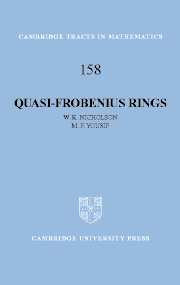Book contents
- Frontmatter
- Contents
- List of Symbols
- Preface
- 1 Background
- 2 Mininjective Rings
- 3 Semiperfect Mininjective Rings
- 4 Min-CS Rings
- 5 Principally Injective and FP Rings
- 6 Simple Injective and Dual Rings
- 7 FGF Rings
- 8 Johns Rings
- 9 A Generic Example
- A Morita Equivalence
- B Perfect, Semiperfect, and Semiregular Rings
- C The Camps–Dicks Theorem
- Questions
- Bibliography
- Index
8 - Johns Rings
Published online by Cambridge University Press: 14 September 2009
- Frontmatter
- Contents
- List of Symbols
- Preface
- 1 Background
- 2 Mininjective Rings
- 3 Semiperfect Mininjective Rings
- 4 Min-CS Rings
- 5 Principally Injective and FP Rings
- 6 Simple Injective and Dual Rings
- 7 FGF Rings
- 8 Johns Rings
- 9 A Generic Example
- A Morita Equivalence
- B Perfect, Semiperfect, and Semiregular Rings
- C The Camps–Dicks Theorem
- Questions
- Bibliography
- Index
Summary
A ring R is called a right Johns ring if it is right noetherian and every right ideal is an annihilator. All these rings were once thought to be right artinian, but in 1992 Faith and Menal gave an example of a right Johns ring that is neither right nor left artinian (see Example 8.16 in Section 8.3). In 1993, Faith and Menal asked whether every strongly right Johns ring is quasi-Frobenius, where R is called a strongly right Johns ring if Mn(R) is a right Johns ring for all n ≥ 1, equivalently if R is right noetherian and left FP-injective (by Theorem 5.41 since right Johns rings are left P-injective). This question remains open. Note that Björk's example (Example 2.5) is a left and right artinian ring R that is left Johns but not quasi-Frobenius. Hence M2(R) cannot be left Johns since, otherwise, R would be a left 2-injective ring by Proposition 5.36, which is a contradiction. Thus R is a two-sided artinian, left Johns ring that is not strongly left Johns.
The Faith–Menal example has the additional property that the right socle is essential as a right and as a left ideal. Hence it shows that the following theorem of Ginn and Moss does not have a one-sided version: A left and right noetherian ring with essential right socle is left and right artinian.
- Type
- Chapter
- Information
- Quasi-Frobenius Rings , pp. 201 - 213Publisher: Cambridge University PressPrint publication year: 2003

